n = 1
1. Tariffs: I am not an economist, and I don't even play one on TV. But these blanket tariffs, (code for taxes), sort of feel wrong to me. It is super complicated for sure, but the idea that in 2018 we (America), wants to value one kind of industry over another, mostly based on some romanticized recollection of the past, is misguided. We will see how this pans out of course, and like lots of these kinds of things the impacts will likely be less dramatic in the real world than the current headlines suggest.
2. TECH: Yesterday I shared some data about the growth and marker share of the 'smart speaker' market - Echo, Google Home, etc. I am incredibly bullish on how these devices and voice assistants in general are going to impact workplace tech. In my down time I have been working on a little project for the Amazon Alexa platform that I hope to get launched in the next week or two. Stay tuned for that.
3. Winter: it is still snowing here in Western NY. That is not surprising so it can't really be described as disappointing. It is sad though. A few items below there's another observation about Rochester, NY that will make more sense when considering how long and cold and miserable the winters can be here.
4. HR Happy Hour: Lots of great stuff on the HR Happy Hour Show and the HHH family of shows. Go to the HR Happy Hour Show Page to get caught up, and subscribe wherever you get your podcasts. We started the HR Happy Hour way back in 2009. Amazing it is still going strong after all this time.
5. Sports: I have never been less interested in my New York Knicks. Once franchise player (and hopefully savior), Kristaps Porzingis went down injured the team has become simply unwatchable. I think I can name more players on the US Olympic Curling Team than I can on the current Knicks. Dreadful.
6. JOBS: Writing this over a coffee as the monthly US Employment report hit the news. Wow - 313,000 jobs added in February 2018. That's a huge number. Unemployment rate held at 4.1% due to lots more people re-entering the labor force - makes sense since the economy is adding so many jobs. Have fun recruiting for those 'hard to fill' positions. Maybe, just maybe it's time to raise wages?
7. Location: On the same CNBC show that I caught the Jobs report update, one of the 'expert' analysts was discussing job and skills training, and the role of the private sector vs. the public sector with respect to re-skilling workers who are impacted by automation and shifting labor market needs. My ears perked up when explaining why companies need to 'own' training current and future workers he remarked, 'Let's say you own a company in Rochester, NY, (NOTE: Where I live). No one is relocating to Rochester, NY to take your open jobs. You have to re-train the people who are already there if you want to fill those jobs." Ouch. Probably more or less true. I am about 15 months from getting out of here myself.
8. Oscars: Trish and I did pretty well on our Academy Awards Predictions on the Happy Hour. Sufjan Stevens was robbed in the Best Song category though. (Embed below, email and RSS subscribers click through)
9. Social Media note of note: I have pared down my social media use to (mostly automated/scheduled) Twitter updates and (oddly enough) posting travel pics on the Chinese social media app WeChat. Over a decade on various social apps has me burned out from them. I have not logged in to Facebook in probably a year, (although links to the blog still post there) and stopped posting (and checking) Instagram last summer. Not that anyone cares. But once in a while someone tries to get in touch with me on one of those apps and I just wanted to let anyone who does care know that I don't see any those messages. I kind of feel like I'm not alone in drifting off in terms of social media use/addiction. Who knows, maybe blogs will stage a comeback!
10. FOOD: Shamrock Shakes are back. Enough said.
Have a great weekend!
 n = 1 tagged
n = 1 tagged  HR,
HR,  HR Happy Hour,
HR Happy Hour,  Technology,
Technology,  data,
data,  pop culture,
pop culture,  surveys
surveys  Email Article
Email Article 
 Print Article
Print Article 



